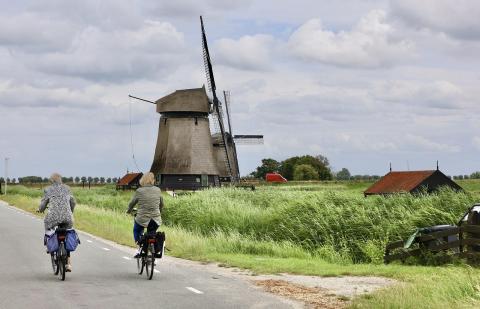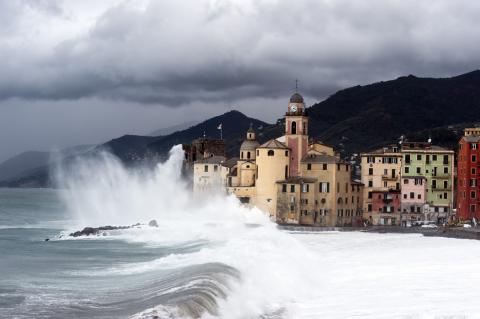Reaction to Mbappé and Galtier's (PSG) press conference and their response to the question about air travel and climate change
At Paris Saint-Germain's (PSG) press conference ahead of their Champions League opener, Kylian Mbappé and Christophe Galtier (PSG player and coach) were asked about the team's recent trip by plane to Nantes and why they didn't travel by train, when the distance is 341 kilometres and the train takes less than two hours. Both laughed at the question and Galtier replied, ironically, that next time they were considering doing it in a "sailing carriage".

Fernando Valladares - Mbappé EN
Fernando Valladares
PhD in Biology, CSIC researcher and associate professor at the Universidad Rey Juan Carlos de Madrid
In this climate emergency situation that we are in, it is absolutely irresponsible for people with public visibility and media attention, such as footballers and coaches - in this case Mbappé and Galtier of PSG - to trivialise the seriousness of the situation related to climate change.
One of the key measures we have to mitigate climate change has to do with the transport system. Air travel must be reduced; there is no room for any joke, any irony, any joking about the fact that short journeys must be made by train or any other means of public transport other than air travel. This is already widely accepted, widely accepted by the majority of citizens, and it is highly irresponsible and offensive for jokes to be made in the public media about changing their mode of transport.
This player and this coach are also citizens of this planet and, even if they have money and possibilities to take those planes, they should go by train. If they cannot go by train, they should explain it and, above all, they should show shame and concern for not being able to do so. There is no room for irony and jokes. To say that next time they will go "in a sailing carriage" is really disrespectful, as well as deeply irresponsible. Those of us who hear this should be ashamed of ourselves and, of course, apply zero tolerance to such comments, starting with the media. Zero tolerance for jokes like this because we all have a lot at stake.
Xavier Rodó - Mbappé EN
Xavier Rodó
ICREA research professor and head of ISGlobal's Climate and Health programme
Air transport has a significant negative impact not only on the planet, in terms of its share of the total pool of greenhouse gas emissions responsible for global warming, but also on human health due to the direct effects of pollutant emissions. Aviation accounts for 13.9% of total transport emissions, being the second largest source of emissions and second only to road transport.
Direct health impacts are most intense on people working at airports and on airport users, as well as on nearby metropolitan populations. Airports generate both direct pollution, resulting from their own activities, and indirect pollution, due to associated activities such as transport of users, workers and goods. Air pollutants and noise have multiple health effects, especially cardiovascular and respiratory diseases and mental health effects. It should be borne in mind that jet aircraft emit ultrafine particles whose atmospheric concentration can double in the areas surrounding airports and which represent a significant contribution to global warming, which is not adequately taxed (much less for long-haul flights).
This lack of taxation and cost-bearing discourages the necessary and increasingly inevitable green transformation of the aviation industry. Recent research by the Dutch National Institute for Public Health and the Environment has shown that people living near Schiphol are regularly exposed to higher concentrations of ultrafine particles that negatively affect health. On days of high exposure, children with respiratory problems suffer more symptoms and need increased medication. For example, Barcelona and many municipalities in the metropolitan area regularly have levels of air pollution that together account for hundreds of preventable deaths annually. For this reason, any negligent comments such as those made above all show a regrettable ignorance and economic arrogance at a time like the present of severe global energy crisis and planetary climate emergency.
But it is not only about the direct impact on human health, but also about the failure of public figures with such statements to support a model other than that of absurd unbridled growth, which is no longer sustainable, has serious global consequences and puts the planet and our species at risk. Our geographical area (including France, even if you don't know it) is one of the regions where the effects of the current climate change will be particularly felt.
Aviation has traditionally been one of the sectors where greenhouse gas emissions have grown the fastest and although Mbappé and Galtier may not know or care, the EU is taking on board future scenarios that imply a mandatory reduction of aviation emissions in Europe.
Aviation must become more sustainable and healthier, and to achieve this will require substantial changes. These must include, first and foremost, the complete replacement of air travel by medium-haul trains, as well as other transformations of airport facilities. Unbridled and absurd expansion, such as on short distances like the Paris-Nantes route, of air travel and activity runs counter to the Paris Agreement and the EU's commitments to reduce overall emissions by 55% by 2030. And as the European Commission itself shows, while the amount of fuel burned per passenger fell by almost a quarter between 2005 and 2017, passenger traffic increased by 60% in the same period, making the reduction pointless.
As the recent call for action of the Nobel Laureates' summit "Our Planet, Our Future" states, "global sustainability offers the only viable path to human security, equity, health and progress". And this is not about pitting aviation against rail transport. It is clear that in certain circumstances rail cannot simply replace air travel (for example, in islands and regions that are remote or with particular geographical conditions that make connectivity vital for economic livelihoods or logistics).
But Mbappé and his coach Galtier will have to change their way of thinking, whether they want to or not, because there is no alternative, as we are already seeing in the multiple manifestations of the anomalous climate we are suffering in many parts of the planet. And to achieve climate neutrality, the European Green Deal sets reductions in transport emissions of 90% by 2050 (compared to 1990 levels). The aviation sector must contribute to the reduction and there is a need to rethink passenger volume growth and cost/benefit ratios by putting many more variables, not just economic ones, into the equation. In the equation, airports must also commit to structural changes that will turn them into sustainable infrastructures that favour more equitable and emission-free societies. And this needs to be done urgently, there is no time left.



